Note
Go to the end to download the full example code.
Plot on geometry elements#
This example shows how to plot a certain field in different geometric objects such as points, lines and planes.
Imports and load model#
Import modules and set context as Premium.
import matplotlib.pyplot as plt
import numpy as np
from ansys.dpf import core as dpf
from ansys.dpf.core import examples, operators as ops
from ansys.dpf.core.fields_factory import field_from_array
from ansys.dpf.core.geometry import Line, Plane, Points
from ansys.dpf.core.plotter import DpfPlotter
Load model from examples and print information:
model = dpf.Model(examples.find_static_rst())
print(model)
DPF Model
------------------------------
Static analysis
Unit system: MKS: m, kg, N, s, V, A, degC
Physics Type: Mechanical
Available results:
- displacement: Nodal Displacement
- reaction_force: Nodal Force
- stress: ElementalNodal Stress
- elemental_volume: Elemental Volume
- stiffness_matrix_energy: Elemental Energy-stiffness matrix
- artificial_hourglass_energy: Elemental Hourglass Energy
- thermal_dissipation_energy: Elemental thermal dissipation energy
- kinetic_energy: Elemental Kinetic Energy
- co_energy: Elemental co-energy
- incremental_energy: Elemental incremental energy
- elastic_strain: ElementalNodal Strain
- element_orientations: ElementalNodal Element Euler Angles
- structural_temperature: ElementalNodal Structural temperature
------------------------------
DPF Meshed Region:
81 nodes
8 elements
Unit: m
With solid (3D) elements
------------------------------
DPF Time/Freq Support:
Number of sets: 1
Cumulative Time (s) LoadStep Substep
1 1.000000 1 1
Load model’s mesh and define camera position
(obtained with cpos=pl.show_figure(return_cpos=True)). This will be used
later for plotting.
mesh = model.metadata.meshed_region
cpos = [
(0.07635352356975698, 0.1200500294271993, 0.041072502929096165),
(0.015, 0.045, 0.015),
(-0.16771051558419411, -0.1983722658245161, 0.9656715938216944),
]
Create points, line and plane objects#
Create 8 points in the corners and one in the middle:
points = Points(
[
[0.0, 0.03, 0.0],
[0.0, 0.03, 0.03],
[0.0, 0.06, 0.00],
[0.0, 0.06, 0.03],
[0.03, 0.03, 0.0],
[0.03, 0.03, 0.03],
[0.03, 0.06, 0.00],
[0.03, 0.06, 0.03],
[0.015, 0.045, 0.015],
]
)
Show points together with the mesh
points.plot(mesh, cpos=cpos, point_size=15, color="blue")
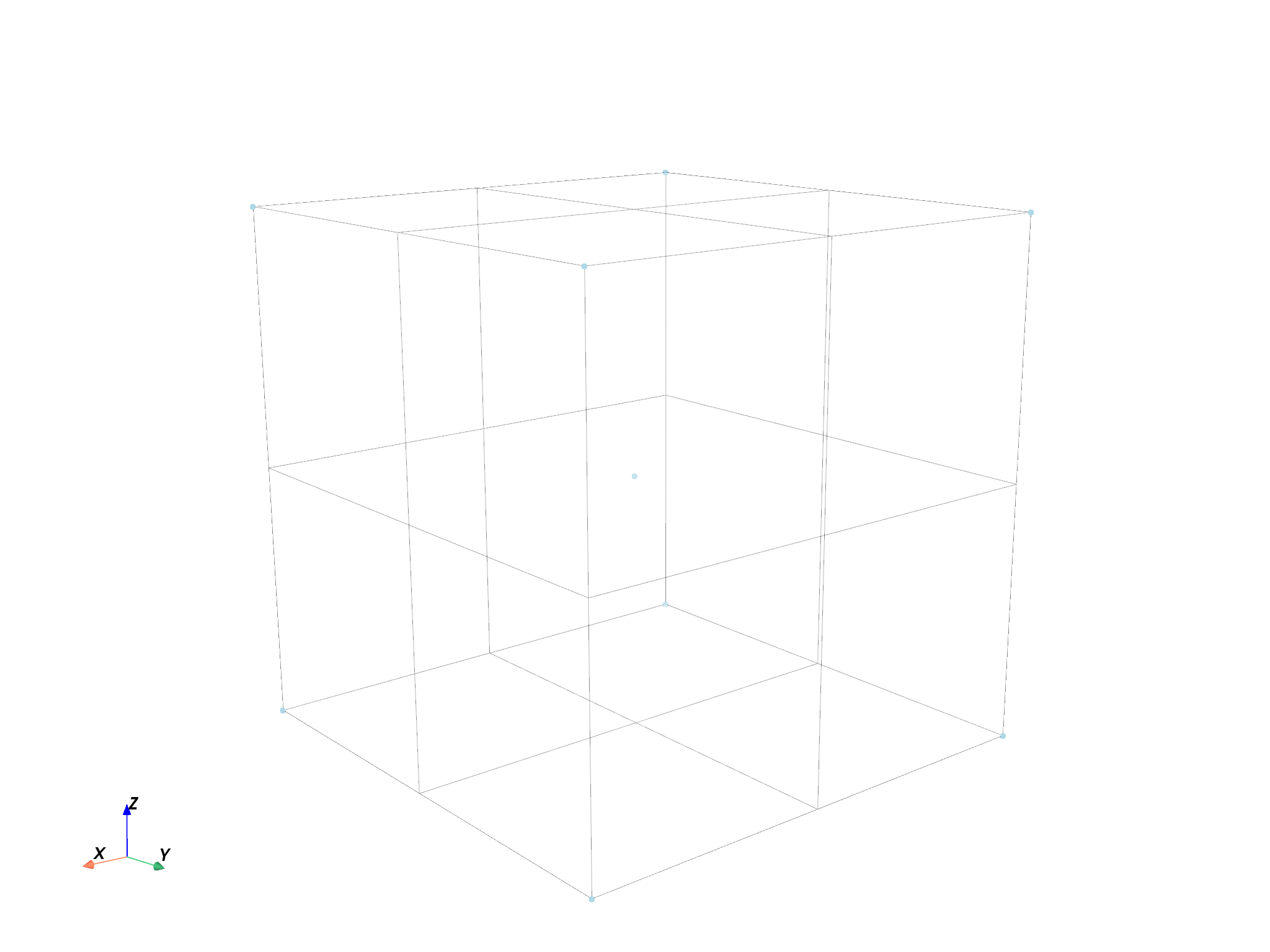
Create line passing through the geometry’s diagonal:
line = Line([[0.03, 0.03, 0.05], [0.0, 0.06, 0.0]], n_points=50)
Show line with the 3D mesh
line.plot(mesh, cpos=cpos, color="black")
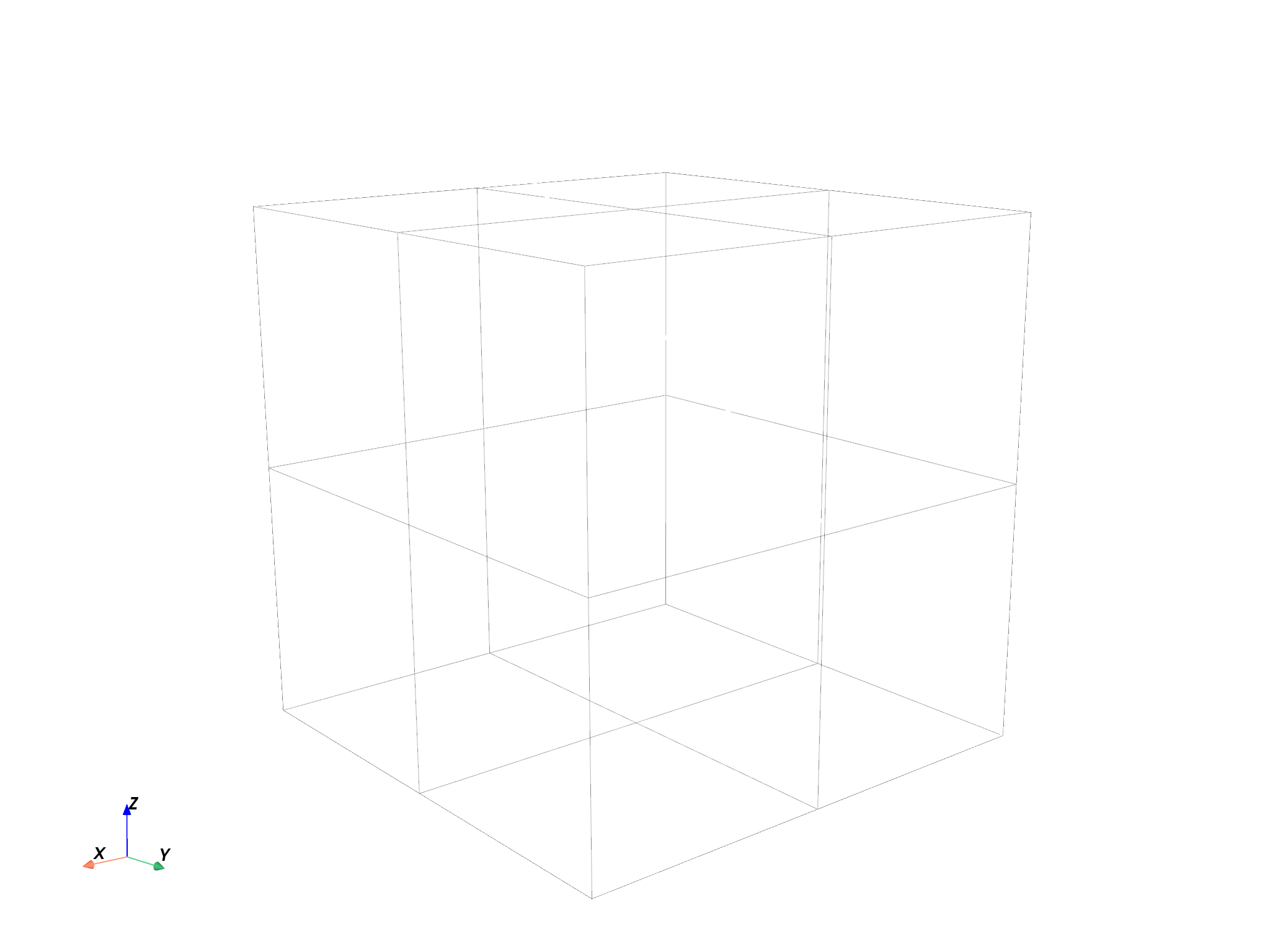
Create vertical plane passing through the mid point:
plane = Plane(
[0.015, 0.045, 0.015],
[1, 1, 0],
width=0.03,
height=0.03,
n_cells_x=10,
n_cells_y=10,
)
Show plane with the 3D mesh
plane.plot(mesh, cpos=cpos, color="red")
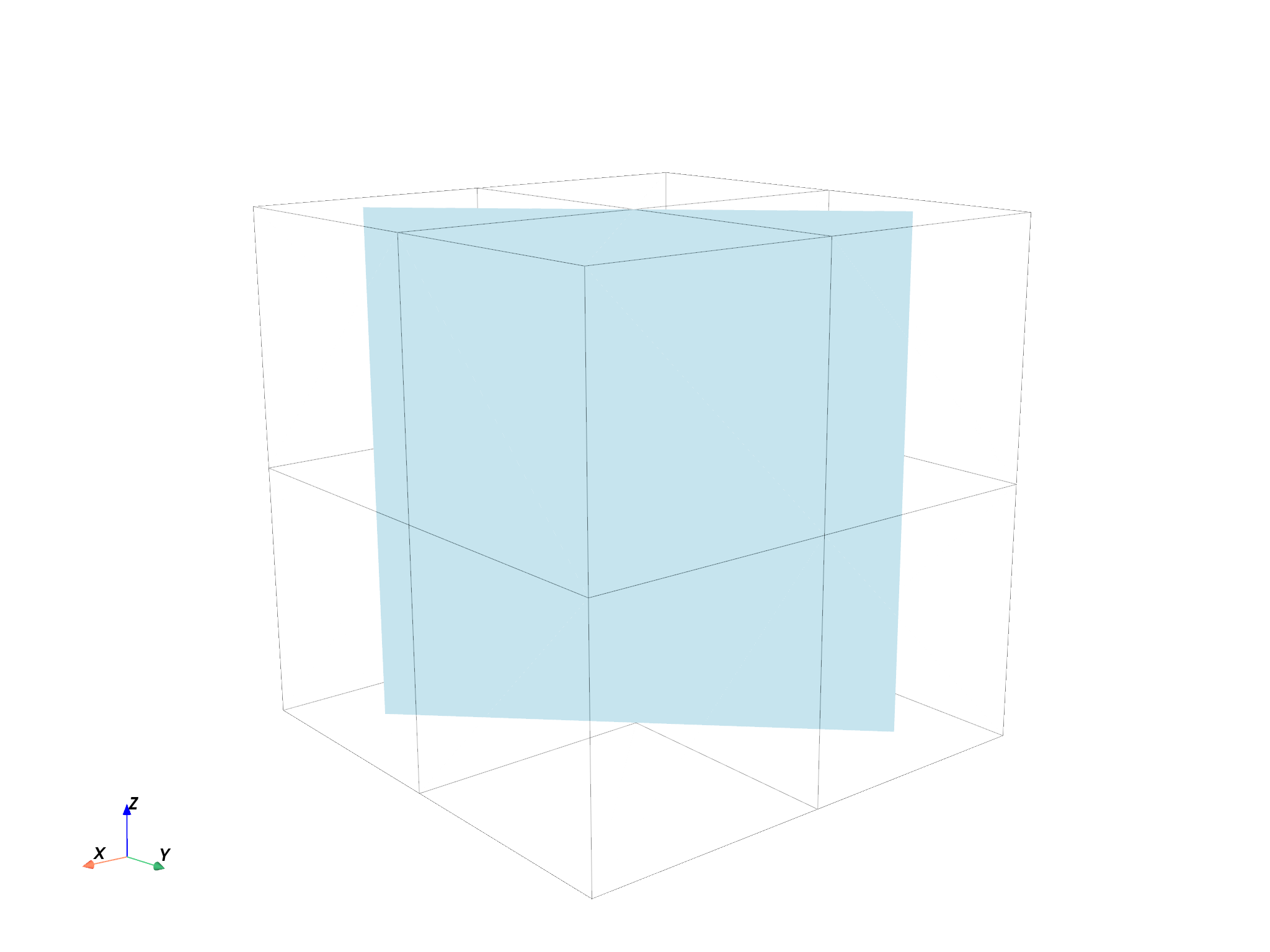
Map displacement field to geometry objects#
Get displacement field from model:
disp = model.results.displacement
Map displacement to points in Points object:
mapping_operator = ops.mapping.on_coordinates(
fields_container=disp,
coordinates=field_from_array(points.coordinates.data),
create_support=True,
mesh=mesh,
)
fields_mapped = mapping_operator.outputs.fields_container()
field_points = fields_mapped[0]
Map displacement to points in Line object:
mapping_operator = ops.mapping.on_coordinates(
fields_container=disp,
coordinates=line.mesh.nodes.coordinates_field,
create_support=True,
mesh=mesh,
)
fields_mapped = mapping_operator.outputs.fields_container()
field_line = fields_mapped[0]
Map displacement to points in Plane object:
mapping_operator = ops.mapping.on_coordinates(
fields_container=disp,
coordinates=plane.mesh.nodes.coordinates_field,
create_support=True,
mesh=mesh,
)
fields_mapped = mapping_operator.outputs.fields_container()
field_plane = fields_mapped[0]
Plotting displacement field on the geometry objects#
3D plot of Points and display mesh:
pl = DpfPlotter()
pl.add_field(field_points, render_points_as_spheres=True, point_size=10)
pl.add_mesh(mesh, style="surface", show_edges=True, color="w", opacity=0.3)
pl.show_figure(show_axes=True, cpos=cpos)
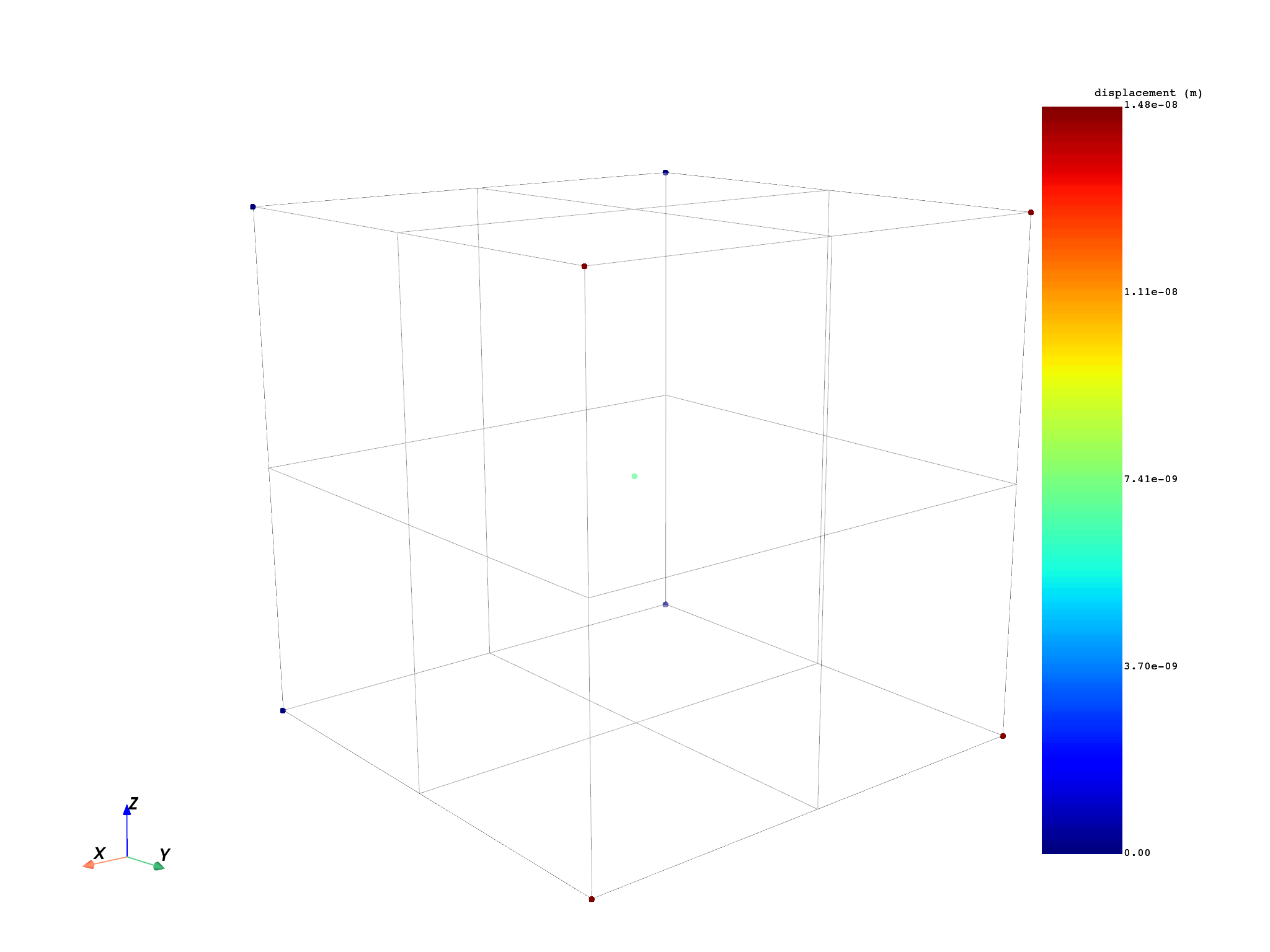
(None, <pyvista.plotting.plotter.Plotter object at 0x000001DD9DE72A50>)
3D plot of Line and mesh. Note that the line is only displayed if some points are found inside the mesh:
pl = DpfPlotter()
if not len(field_line) == 0:
pl.add_field(field_line, line.mesh, line_width=5)
pl.add_mesh(mesh, style="surface", show_edges=True, color="w", opacity=0.3)
pl.show_figure(show_axes=True, cpos=cpos)
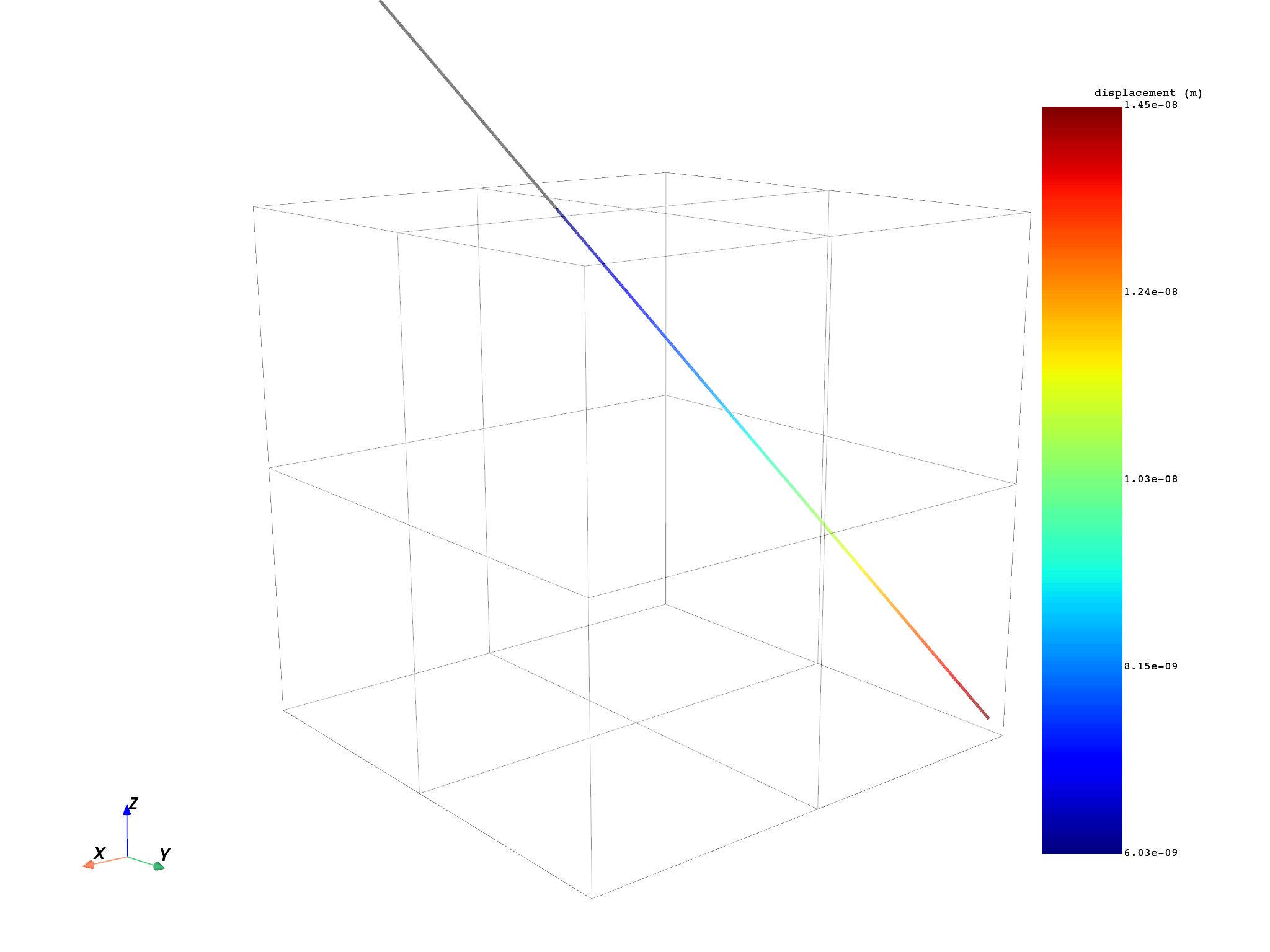
(None, <pyvista.plotting.plotter.Plotter object at 0x000001DD9AC6C750>)
Plot Plane and display mesh in background. Note that the plane is only displayed if some points are found inside the mesh:
pl = DpfPlotter()
if not len(field_plane) == 0:
pl.add_field(field_plane, plane.mesh, show_edges=False)
pl.add_mesh(mesh, style="surface", show_edges=True, color="w", opacity=0.3)
pl.show_figure(show_axes=True, cpos=cpos)
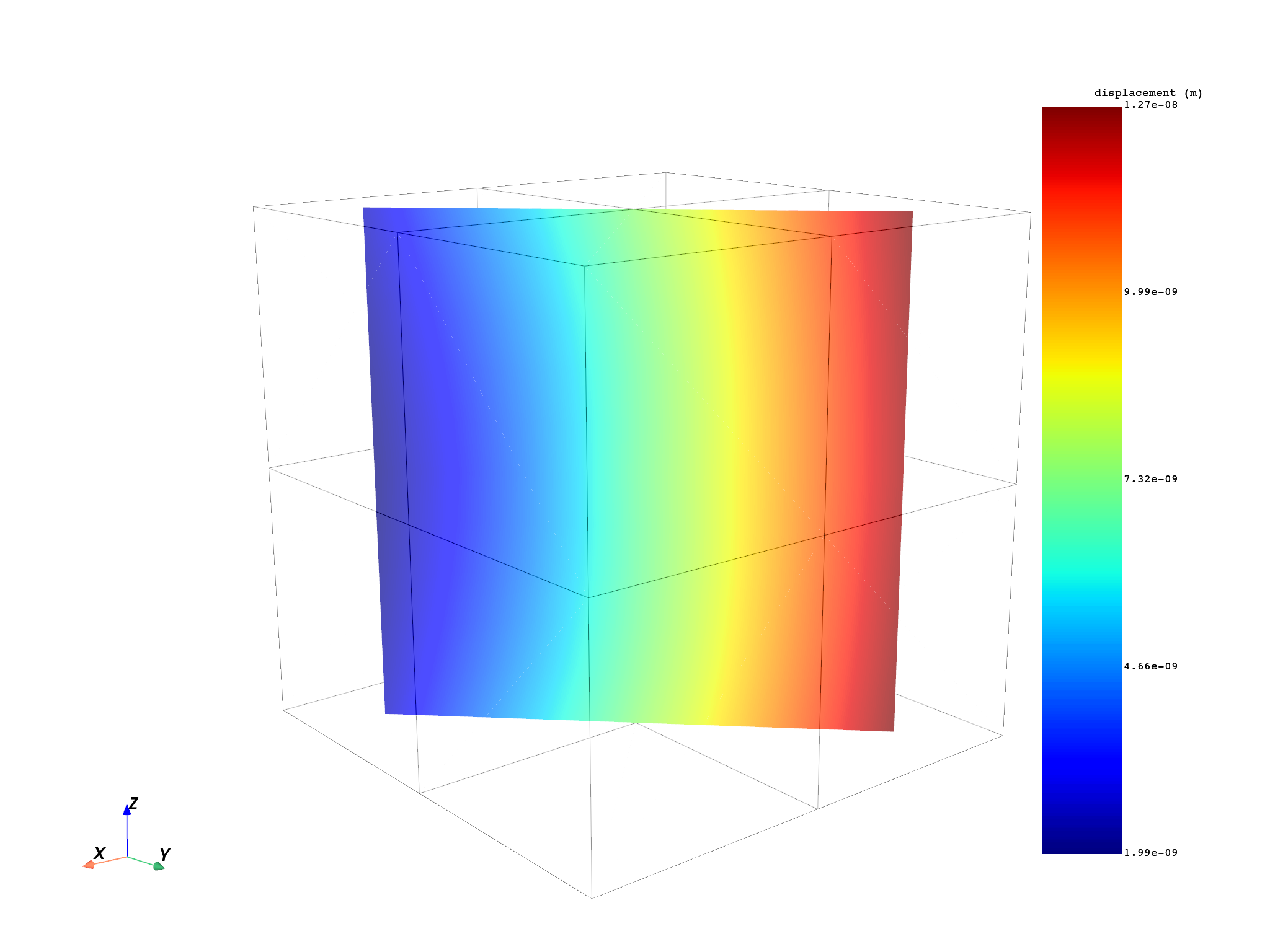
(None, <pyvista.plotting.plotter.Plotter object at 0x000001DD9BFEC5D0>)
2D plot (graph) of Line (line length vs displacement field):
norm_disp = [np.linalg.norm(field_line.data[i]) for i in range(len(field_line.data))]
path = line.path[field_line.scoping.ids - 1]
plt.plot(path, norm_disp)
plt.xlabel("Line length")
plt.ylabel("Displacement norm field")
plt.show()
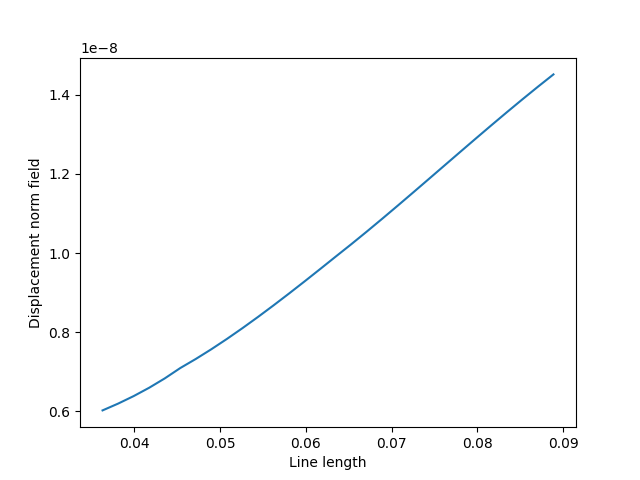
Total running time of the script: (0 minutes 12.625 seconds)

